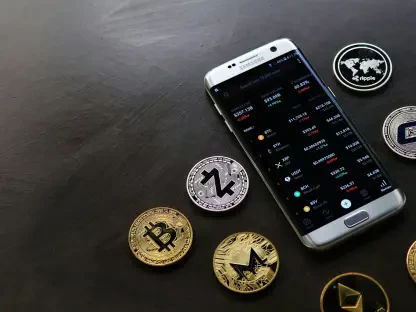In a financial landscape where accessibility and innovation are becoming paramount, a major trading platform has taken a bold step to redefine how investors interact with traditional markets. Imagine being able to trade popular US stocks at any hour of the day, five days a week, without the constraints of standard market schedules. This is now a reality as eToro, a prominent player in the trading world, has tokenized 100 of the most sought-after US-listed stocks and ETFs on the Ethereum blockchain. Utilizing ERC-20 tokens, this initiative marks a significant leap into real-world asset (RWA) tokenization, seamlessly connecting traditional finance with the burgeoning realm of decentralized finance (DeFi). By extending trading hours and offering unprecedented flexibility, eToro is paving the way for a new era of investment opportunities that transcend conventional limitations. This move not only enhances user control but also signals a broader shift toward integrating blockchain technology into everyday financial activities, promising to reshape the future of asset ownership.
Bridging Traditional and Decentralized Finance
The decision by eToro to tokenize US stocks on Ethereum represents a pivotal moment in the convergence of traditional finance, often referred to as TradFi, and DeFi. By transforming well-known stocks and ETFs into digital tokens, the platform enables trading around the clock for five days a week, far surpassing the restrictive hours of conventional stock exchanges. This innovation allows investors to react to global news and market shifts in real-time, without waiting for markets to open. Beyond extended hours, tokenization on Ethereum offers transparency and security inherent to blockchain technology, ensuring that transactions are verifiable and resistant to tampering. CEO Yoni Assia has emphasized that this step is about democratizing finance, breaking down barriers, and eliminating intermediaries that often complicate investment processes. The ultimate goal is to empower users with direct access to assets in ways previously unimaginable in traditional systems, setting a new standard for financial inclusivity.
This initiative also opens doors to unique possibilities within the DeFi ecosystem, extending the utility of tokenized assets beyond mere trading. Once tokenized, these stocks can be withdrawn to personal crypto wallets, allowing users to engage in activities like staking or lending on various decentralized platforms. Picture an investor purchasing tokenized shares of a major tech company on eToro, transferring them to an Ethereum wallet, and then using those tokens as collateral for a loan in a DeFi protocol. Such interoperability between centralized platforms and decentralized systems underscores the transformative potential of tokenization. While this offers remarkable flexibility, it also highlights eToro’s commitment to giving users greater control over their investments. However, regulatory challenges persist, with these tokenized assets currently unavailable in certain regions like the US due to legal constraints. Despite these hurdles, the global push for tokenized finance continues to gain traction, hinting at a future where such barriers may eventually diminish.
Industry Trends and Growing Momentum
Tokenized equities, while still a small fraction of the broader RWA market, are witnessing a surge in interest across the cryptocurrency and fintech sectors. According to recent data from industry trackers, tokenized equities account for just $418 million of a $21.3 billion RWA market, indicating that this space is still in its early stages. Nevertheless, the momentum is palpable, with other major players joining the fray to capitalize on the potential of blockchain-based assets. For instance, Robinhood has introduced a layer-2 blockchain on Arbitrum targeting European users with tokenized stocks, while Backed Finance has listed over 60 tokenized equities on multiple platforms, including DeFi apps on Solana. eToro’s entry into this arena, backed by its extensive user base and established reputation, adds significant credibility and retail reach to the movement. This collective push by industry leaders suggests that tokenized assets are inching closer to mainstream adoption, promising to redefine how investments are perceived and managed.
The broader implications of this trend point to a gradual but undeniable shift toward integrating traditional financial instruments with cutting-edge blockchain technology. eToro is no stranger to tokenization, having previously introduced blockchain-based tokens for commodities like gold and silver several years ago. However, the current focus on publicly traded US stocks represents a more ambitious endeavor with far-reaching impact. The ease of access, transferability, and potential for integration into DeFi protocols are key drivers that could propel rapid growth in this niche market. Industry perspectives vary on whether the future of tokenized finance will be dominated by centralized platforms like eToro or fully decentralized, on-chain systems, reflecting the dynamic and evolving nature of this space. What remains clear is that the fusion of traditional assets with blockchain innovation is creating fertile ground for financial experimentation, potentially leading to a market worth trillions in the coming years.
Future Prospects and Transformative Impact
Looking ahead, the tokenization of US stocks by eToro on the Ethereum blockchain encapsulates a transformative trend that blends the reliability of established markets with the ingenuity of decentralized technology. Reflecting on this milestone, it’s evident that the initiative enhances trading accessibility by providing 24/5 availability, a feature that fundamentally alters how investors engage with markets. It also empowers users to step into DeFi ecosystems, using tokenized assets in ways that traditional stocks never allowed. Although the market for tokenized equities started small, the combined efforts of various industry players and the inherent benefits of tokenization lay a strong foundation for future growth. The journey reveals both the promise and the challenges, particularly around regulatory landscapes that restrict access in certain regions. Moving forward, stakeholders must focus on navigating these legal complexities while continuing to innovate, ensuring that the vision of a more accessible and transparent financial system becomes a widespread reality.









